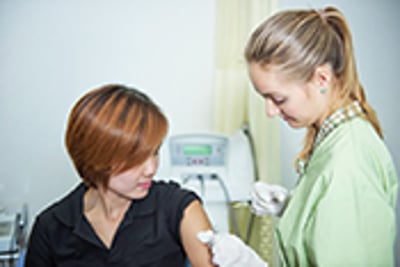All XRAYs



Relevance: Medium-High
Most relevant for: Women who use hair products who are concerned about their risk for breast cancer
Study: Beauty and the breast: hair product use and breast cancer risk
Past studies using mostly animal models showed a link between use of hair products (dyes, straighteners and relaxers) and increased risk of certain cancers. In this study, researchers looked at data on hair product use among African-American (AA) and White women to see if certain types of hair products increased breast cancer risk, and how that risk might differ between race and breast cancer hormone status. (9/27/2017)
READ MORE ›


Relevance: Medium-High
Most relevant for: Any woman concerned about her risk for breast cancer
Article: Can lifestyle changes impact breast cancer risk?
A recent New York Times article shared how “adopting protective living habits” could help keep breast cancer “at bay”. While many of these lifestyle changes and strategies like not smoking, avoiding weight gain, reducing alcohol consumption, eating a heart-healthy diet, and increasing physical activity have been shown to reduce breast cancer risk, there are other risk factors that one cannot control such as having a BRCA or other mutation that significantly increases breast cancer risk. Importantly, no one strategy has been proven to totally eliminate breast cancer risk. However many of these approaches have overall health benefits. (9/21/2017)
READ MORE ›


Relevance: Medium-High
Most relevant for: Jewish women with breast cancer who previously tested negative for the three most common BRCA mutations
Study: Does expanded genetic testing benefit Jewish women diagnosed with breast cancer?
BRCA1 and BRCA2 mutations are common in people of Eastern European (Ashkenazi) Jewish descent. About 2% of all Ashkenazi Jewish people will test positive for one of three common mutations in these genes. Genetic testing for Jewish people sometimes focuses on only the three most common mutations. For Jewish women with breast cancer, little is known about their chance of carrying a different hereditary mutation that may increase risk. This study looked at expanded genetic testing in Jewish women diagnosed with breast cancer to learn how often they carried mutations other than the three most common BRCA gene mutations found in Ashkenazi Jewish people. (09/13/17)
READ MORE ›


Relevance: Medium
Most relevant for: Women with abnormal mammograms
Study: Breast cancers can disappear without treatment: fact or fiction?
Previous studies and news headlines have reported that it is possible for breast cancers to regress or disappear on their own. Is this true? The authors of the current research study show that of 479 untreated breast cancers detected by screening mammography, none regressed or spontaneously disappeared on their own. (9/7/17)
READ MORE ›


Relevance: Medium-High
Most relevant for: Women at average risk for breast cancer
Study: Does aspirin lower a woman’s breast cancer risk?
Women who take aspirin regularly may have a reduced risk of breast cancer. However, previous studies have reported mixed results. Few of these studies have looked at whether this potential benefit of aspirin is linked to specific types of breast cancer. This study found a small reduction in breast cancer risk for women who took a low-dose aspirin at least three times per week, but only for one subtype of breast cancer. Women who took aspirin were less likely to develop ER/PR-positive, Her2- negative breast cancer, the most common type of breast cancer. This study found no breast cancer risk reduction for women who used regular-dose aspirin or other nonsteroidal anti-inflammatory drugs (NSAIDS). (8/29/17)
READ MORE ›


Relevance: Medium-High
Most relevant for: Parents who have an inherited gene mutation
Article: Parents face challenges when deciding the best time to tell children that they may be at high risk for cancer
When certain types of cancers run in families, genetic testing can determine whether the cause is hereditary. Genetic testing can help family members understand their cancer risk and make medical decisions to stay healthy. A test result can provide significant insight, but it also creates challenges for parents, because gene mutations that cause hereditary cancers can be passed from mothers and fathers to sons and daughters. People with these mutations must make difficult decisions about when to tell their children that they too may have inherited the mutation. (8/22/2017)
READ MORE ›


Relevance: Medium
Most relevant for: Asian American women
Study: Breast cancer rates are rapidly increasing among Asian women in California
The majority of racial groups in the United States have seen declines in breast cancer rates. However, this study provides new insights into the patterns of breast cancer rates in Asian American subgroups in California. Using 26 years of data, this research found that breast cancer is rapidly increasing among this population, contrasting to a decline in rates among non-Hispanic white women in California and nationwide. (8/15/17)
READ MORE ›


Relevance: Medium
Most relevant for: Women at average risk for breast cancer
Study: Do physicians recommend breast cancer screenings based on guidelines?
Several guidelines help physicians decide when a woman should begin screening for breast cancer and how often she should be screened. However, are these guidelines put into use in the clinic? (8/8/17)
READ MORE ›


Relevance: Medium-Low
Most relevant for: High risk women who have not had breast cancer
Article: Report on vaccines to prevent hereditary cancer
On 05/30/2017, Good Morning America aired a segment entitled “Can a vaccine help prevent breast cancer at its earliest stages?” The story outlines the need for cancer prevention and hints at early research into a cancer vaccine. (8/1/17)
READ MORE ›


Relevance: High
Most relevant for: Women with an inherited mutation in BRCA1 or BRCA2
Study: New cancer risk estimates for BRCA1/2 mutation carriers
Cancer risk estimates for BRCA1 and BRCA2 mutation carriers are important because they impact patient decision-making. Until now, almost all risk estimates for mutation carriers were based on results of retrospective studies that looked back on mutation carriers who had cancer. This new study is prospective—it followed almost 10,000 BRCA mutation carriers without cancer to see if or when they developed breast or ovarian cancer. The cancer risk estimates of this study may be more accurate because it followed mutation carriers who did not have cancer over time. (7/28/17)
READ MORE ›